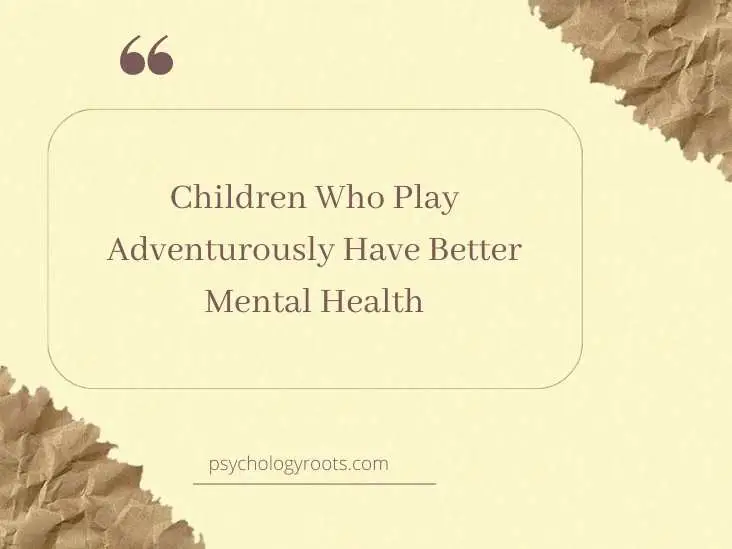Table of Contents
Children Who Play Adventurously Have Better Mental Health
Here in this post, we are discussing “Children Who Play Adventurously Have Better Mental Health”. You can read more about psychology-related material on our website. Keep visiting Psychology Roots.
According to the study, children who played more adventurously had less anxiety and depression symptoms and were happy during the first COVID-19 lockdown.
Play that was “thrilling and exciting,” where children may feel some anxiety and uncertainty, was requested of parents by researchers at the University of Exeter.

Children Who Play Adventurously Have Better Mental Health
Today’s youngsters have less possibilities than ever before to engage in risky play away from adults’ gaze, such as climbing trees, riding motorcycles, or leaping from high places. The research was published in Child Psychiatry & Human Development.
Testing hypotheses that children’s resilience is built via adventurous play was the goal of this research.
Over 2,500 parents of children 5-11 years old were polled by the study’s researchers. While the initial COVID-19 lockdown was in effect, parents were asked a series of questions concerning the activities their children were engaged in, their overall mental health (before to COVID), and their mood.
For the study, 427 parents in Northern Ireland and 1919 parents in Great Britain were surveyed. The research was conducted with both groups (England, Wales and Scotland).
In a study, researchers discovered that youngsters who spent more time playing outdoors were less likely to suffer from “internalising problems”—anxiety and despair. During the initial lockdown, the youngsters were likewise more upbeat.
Due to the wide variety of variables that impact children’s mental health, the results were predicted to be minimal. The findings remained similar even after researchers accounted for several demographic characteristics, such as the gender of the kid, the parents’ work position, and the parents’ mental health.
Additionally, a research in Great Britain indicated that the impact was more prominent in children from lower-income homes than those from more affluent families.
Researcher Helen Dodd says “we are more worried than ever about children’s mental health, and our results show that we may be able to assist preserve children’s mental health by ensuring that they have sufficient chances for exploratory play.”
This is a beneficial development since play is free, natural, and enjoyable for children, accessible to everyone, and does not need particular abilities. As a society, we urgently need to develop and safeguard natural areas, well-designed parks and adventure playgrounds, to promote the mental health of our children.”
All children deserve the chance to play, says the Director of UK Impact at Save the Children, Dan Paskins. Considering what children have lost as a result of the COVID-19 limitations, this is an even more critical way to ensure their well-being.
The more you play, the more you’ll be happy and less likely to suffer from sadness and anxiety. That’s why Save the Children is sponsoring the Summer of Play initiative, which brings together groups from all across the nation to offer their support to allow children to have fun, spend time with friends, and enjoy their independence.
“This study underscores the significance of adventurous play,” says Jacqueline O’Loughlin, Chief Executive of PlayBoard NI, in welcoming the results.
We believe that children and adolescents should have the opportunity to experience a range of emotions and situations in the course of their daily lives. Children’s mental health and emotional well-being are positively impacted by playing, taking chances, and feeling excitement outside, according to study. Self-regulation and management of difficulty in children’s play has a broad range of positive effects.
According to research, “adventurous play helps youngsters grow the resilience required to adapt and regulate stress in difficult situations.”
Help Us Improve This Article
Have you discovered an inaccuracy? We put out great effort to give accurate and scientifically trustworthy information to our readers. Please notify us if you discover any typographical or grammatical errors.
Make a comment. We acknowledge and appreciate your efforts.
If you have any scale or any material related to psychology kindly share it with us at psychologyroots@gmail.com. We help others on behalf of you.